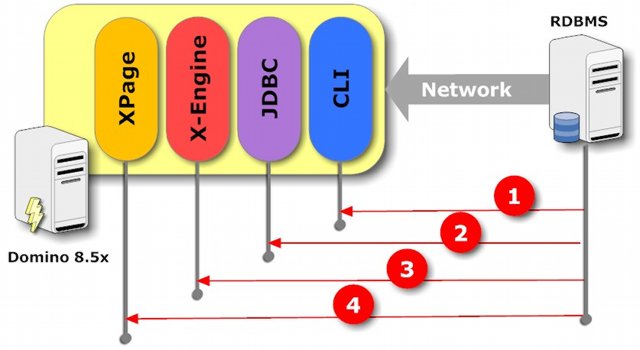Measuring performance when accessing a RDBMS from Domino
Accessing RDBMS from Notes applications is quite popular. One of our customer asked what is an acceptable performance when accessing an Oracle database from XPages. We discussed test patterns and approaches. Just running one type of test wouldn't give an accurate picture. The total time for a test run is compiled from the raw database access speed (mostly network and the local driver performance), the Java JDBC layer, the XPages engine and the application running on XPages. So you have to test all these components:

So how to test these (you could rip the steps apart on a scientific basis, but they hold steady for practicality). Never forget that the subject and object of an observation influence each other. The bare fact of measuring the performance changes it:

So how to test these (you could rip the steps apart on a scientific basis, but they hold steady for practicality). Never forget that the subject and object of an observation influence each other. The bare fact of measuring the performance changes it:
- Network and native library: You use the command line interface (in Oracle a terminal like window) to execute whatever query you want to test. Record the time. You can proably automate this using a tool like STAF. This is your base line. If that is already slow, you know network and database might be the problem already (and yes: you could run the test on the DB server too eliminating the network in between too).
- JDBC and Connection pool: You don't write your own Connection Pool manager? Using a few lines of Java again from the command line will show how your VM is doing and how well the JDBC driver talks to the native libraries. You would already have a class that implements the Java LIST interface (preferably as virtual list), so you can use that as a data source later on. Heap size is a good candidate to tweak performance here
- XPages engine: You have code in one button instantiating the class you already used in the previous step and execute the same queries. This will show you the difference between "raw" Java performance and the XPages engine
- Your XPages application: All your code is here, your events, your JavaScript. The difference to the previous step highlight optimization potential in your code
Posted by Stephan H Wissel on 11 August 2009 | Comments (0) | categories: Show-N-Tell Thursday